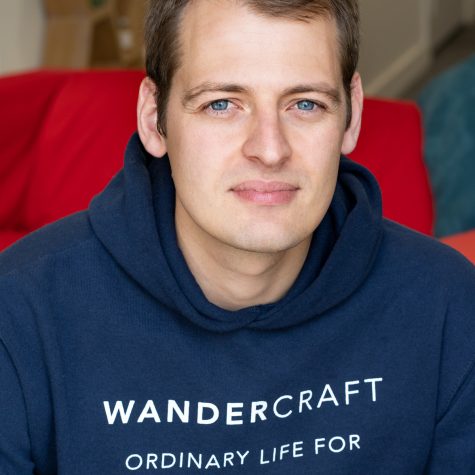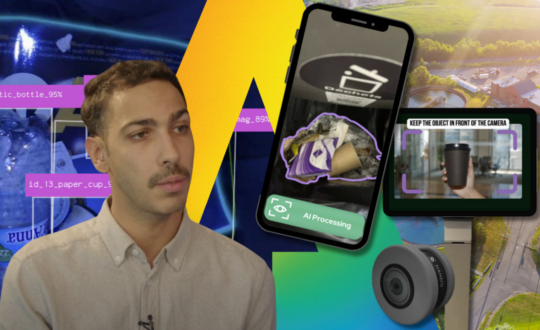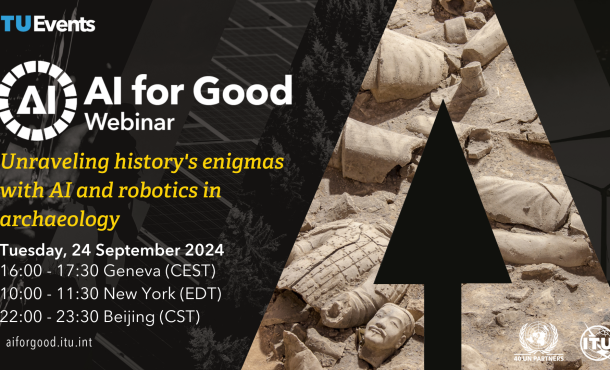Meet Wandercraft, an innovative care start-up that develops AI-powered walking exoskeletons for mobility and independence

- 17 April 2024
By Alena Radziukevich
In a time where technological advancements align with the pursuit of global sustainability objectives, the adoption of AI paired with robotics technologies becomes imperative to accelerate progress towards achieving the United Nations Sustainable Development Goals (SDGs).
The Robotics for Good Innovation Factory is a global competition hosted by the International Telecommunications Union for start-ups that offer cutting-edge solutions to societal challenges in numerous fields.
On 7 November 2023, during the first in a series of global start-up pitching sessions titled “Meet the Robotics for Good start-ups advancing sustainable development – 1st Session,” four top entrepreneur finalists were selected by the Robotics for Good Innovation Factory judges to present their innovative solutions helping to accelerate the 2030 Sustainable Development Goals Agenda.
After thorough discussions and impressive pitches, Wandercraft with their state-of-the-art Atalante X hands-free walking exoskeleton for rehabilitation solution was nominated the first prize by the panel of judges.
As a winner, Wandercraft received a prize package including the pitching opportunity and a ticket to the AI for Good Innovation Factory Grand Finale at the AI for Good Global Summit 2024, a VIP Pass, an exhibition booth, as well as exclusive mentoring from the judges, and networking opportunities with the UN.
The winning package also included travel support from KUKA to participate at the AI for Good Global Summit, an exhibition booth at the World AI Cannes Festival 2024, and a 1-year residency at MassRobotics.
We spoke to Nicolas Simon, the Founder and President at Wandercraft. During the interview, Nicholas shared illuminating insights about the history of the company and team’s inspiration that drives the innovative spirit towards a brighter and more sustainable future, and here are the five key things you should know about.
Can you tell us about your winning solution?

Back in 2012, a team of determined engineers and entrepreneurs founded Wandercraft in Paris, France, aiming to transform how people with mobility impairments experience the world. Among the founders were Nicolas Simon, Matthieu Masselin, and Jean-Louis Constanza, who were driven by personal connections to mobility challenges caused by Charcot Marie Tooth (CMT) disease – an inherited condition that causes nerve damage, leading to muscle weakness and numbness. This wasn’t just a business venture—it was personal.
Nicolas Simon was driven by his own family’s struggles with this genetic disease, a condition that slowly took away his brother’s ability to run, ski, and eventually walk. As a young engineering student, he questioned the status quo: “Why are wheelchairs the only option?”
On the other side of town, Jean-Louis Constanza faced a similar challenge. His young son, Oscar, also diagnosed with CMT, got his first wheelchair and innocently asked his dad, “Why don’t you make a robot to help me walk?” This question from a six-year-old put everything into perspective and spurred a quest for innovation.
“The wheelchair is an old technology, dating back as far as the advent of the wheel itself. Walking, on the other hand, is a miracle of evolution, taking millions of years for humans to develop and perfect,” shared Nicolas Simon.
With all its complexities, building a safe walking robot, piloted by a non-walking human, was robotics’ most impossible challenge. Until now…
Over a decade later, Wandercraft’s self-balancing robotic exoskeletons has empowered individuals to take control of their mobility and well-being. Their innovative self-balancing robot technologies operate at the intersection of best-in-class robotics powered by intelligent multi-directional walking algorithms that will enable even the most complex patients to stand-up and walk, balance independently, and autonomously navigate their homes and out in communities.
Where are you from and what regions do you work in?
Wandercraft originated in Paris, France, where it was founded. The company has since expanded, with their main headquarters now based in New York. They operate across two major regions— the Americas and Europe. Wandercraft’s innovative exoskeletons are in use at various rehabilitation institutions and clinical research centers throughout these areas, with nearly 100 of their units deployed globally. This wide distribution underscores their commitment to improving mobility and quality of life for individuals with impairments, no matter where they are located.
How can your solution help to solve the United Nations Sustainable Development Goals?

Wandercraft’s robotic solutions are pivotal in addressing key United Nations Sustainable Development Goals, particularly those related to health and well-being (SDG 3) and reducing inequalities (SDG 10).
Their robotic exoskeletons significantly enhance the quality of life for individuals with mobility impairments by enabling them to stand and walk independently. This not only promotes physical health by reducing the sedentary lifestyle associated with prolonged wheelchair use but also improves overall well-being.
“Our exoskeletons enable individuals with mobility impairments to engage in daily activities and exercise, enhancing their quality of life,” noted Nicholas Simon.
This direct engagement is crucial for maintaining physical health and fostering a sense of independence.
Moreover, Wandercraft’s technology plays a crucial role in diminishing social and economic disparities. By providing individuals with disabilities the means to navigate their environments autonomously, the exoskeletons foster greater social inclusion and accessibility. This ability to participate more fully in society helps break down the barriers that typically hinder full participation in various aspects of life, addressing the core objectives of SDG 10. Through these innovative solutions, Wandercraft contributes to creating a more inclusive and equitable world for all.
What is your biggest challenge as a robotics start-up?
As a robotics and AI start-up, Wandercraft’s biggest challenge is ensuring access to their technology and making it available to as many patients as possible.
Their exoskeletons provide hope for recovery for the many patients who use them—in the U.S. alone more than 795,000 people suffer from a stroke each year, approximately 302,000 people who have experienced a traumatic spinal cord injury, and approximately one million people live with multiple sclerosis.
“The immense value in being able to offer these patients the opportunity to stand and hug a loved one cannot be emphasised enough,” highlighted Nicolas Simon.
In addition to the challenge of ensuring medical access for every patient around the world, the team is always thinking about the fields of Robotics and AI, and how they can play their part in nurturing a talent pool of experts and engineers moving the field forward. This is why Wandercraft regularly sponsors events and competitions at the college level, creates employment opportunities for up-and-coming engineers ready to hone their applied expertise, and provides sponsorships to Ph.D. students in Robotics and AI to ensure a bright future for this space.
Why did you join the Innovation Factory Pitching Competition?
The start-up shared the excitement they had when they got the opportunity to showcase their innovative robotic exoskeleton technologies and connect with the global community of leaders and innovators.
“We firmly believe in the importance of sustainable development, and we are keen to pioneer these goals through our efforts in the health and robotics industries,” underscored Nicolas Simon.
In conclusion, this Robotics for Good Innovation Factory session highlights the transformative impact that cutting-edge robotics can have on advancing the United Nations Sustainable Development Goals.
As we approach the upcoming AI for Good Global Summit 2024, a collective determination to explore new technologies and collaborations is essential for harnessing the potential of robotics to create a more inclusive and equitable society, ultimately driving progress towards a universally accessible and sustainable future.













